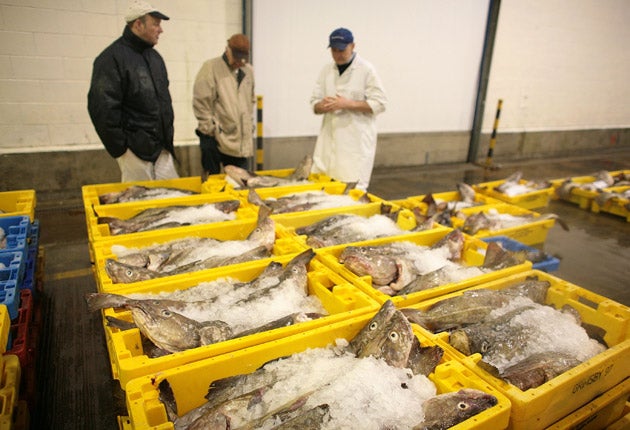Government hits out at EU fishing rules

Your support helps us to tell the story
From reproductive rights to climate change to Big Tech, The Independent is on the ground when the story is developing. Whether it's investigating the financials of Elon Musk's pro-Trump PAC or producing our latest documentary, 'The A Word', which shines a light on the American women fighting for reproductive rights, we know how important it is to parse out the facts from the messaging.
At such a critical moment in US history, we need reporters on the ground. Your donation allows us to keep sending journalists to speak to both sides of the story.
The Independent is trusted by Americans across the entire political spectrum. And unlike many other quality news outlets, we choose not to lock Americans out of our reporting and analysis with paywalls. We believe quality journalism should be available to everyone, paid for by those who can afford it.
Your support makes all the difference.The Government has launched a new attack on controversial EU fishing rules which force fishermen to throw millions of dead fish back into the sea.
Fisheries Minister Richard Benyon, attending a special EU summit to tackle the problem, said: "Everybody wants to see an end to the disgraceful waste of huge amounts of fish having to be dumped back overboard, and the UK is leading the way in efforts to tackle the problem.
"I'm determined to keep pushing for reforms in Europe that prevent this waste, while fighting to protect our fishermen's livelihoods.
"We need a new and sustainable Common Fisheries Policy (CFP) which protects our seas and manages vulnerable fish stocks better while allowing our fishermen to make a living and plan for the future."
Under current CFP rules, fishing fleets governed by catch limits for certain species cannot land their "by-catch" - any species of fish they have netted accidentally or which take vessels over their allocated quota.
The so-called "discard" is thrown back, dead, into the sea.
UK trials are already going on with a new system in the North Sea cod fishery involving 23 English and Scottish vessels.
The scheme counts all fish caught, including the "discard", as part of the total cod quota, obliging fishermen to stop fishing once their tonnage limit is reached, regardless of species.
The Government says the system puts the responsibility on fishermen to use their skill and knowledge to fish more selectively. It increases the landed catch without increasing quotas, avoiding waste and helping stock conservation.
Mr Benyon was at fisheries talks called by the European Commission, which has acknowledged that a system encouraging discards cannot continue.
But Mr Benyon's Scottish counterpart Richard Lochhead was absent - because EU Fisheries Commissioner Maria Damanaki insisted that only one minister per EU member state could attend.
Mr Lochhead commented: "Across Europe, Scotland is recognised as being at the fore of innovative ways to address the nonsensical practice of discarding marketable fish back in the sea, dead.
"Commissioner Damanaki has expressed her desire to work closely with Scotland on the issue, therefore it is very disappointing that my request to take part in a key EU meeting on discards has been declined."
He went on: "Even though Scotland is home to the EU's largest whitefish fleet, the UK Government is not willing to allow Scotland the opportunity to attend on behalf of the UK and share our experiences at a meeting to shape EU policy on tackling discards.
"Incredibly, landlocked countries such as Austria and the Czech Republic have been invited to take part, despite their lack of a coastline, never mind a fishing fleet."
Mr Lochhead says Scotland has worked effectively against discards, via the Conservation Credits Scheme and a "catch quota" trial which rewards fishermen with increased quota in return for no discards.
Since 2008, discards by Scottish whitefish vessels in the North Sea have fallen by half.
He said: "I urge Europe to look to Scotland's example, where reductions in discards have been achieved at a faster rate than anywhere else in the EU, and not miss a golden opportunity to address the problems that the flawed Common Fisheries Policy is causing."
Scottish Conservative MEP Struan Stevenson commented: "It is simply not sustainable to pursue a management policy that forced Europe's fishermen to dump up to one million tonnes of perfectly healthy fish back into the sea, dead, annually, when 80% of EU fish stocks are either over-exploited or under threat of imminent collapse."
Ms Damanaki told the BBC Radio 4 Today programme: "We can't go on with business as usual. This is something we could afford when we had healthy stocks, but now, when stocks are declining, nobody can justify that we take fish and - because of our policy - we force people to throw it back.
"This is unacceptable. We have to abandon discarding."
The Commissioner said nobody denied that something needed to be done, but accepted there was a clash of views between environmentalists and some fishermen on the issue.
"This is a controversial issue," she said. "On the one hand we have citizens, NGOs (non-governmental organisations) and civic society saying that discarding is unethical. When you see these pictures of fishermen throwing fish back into the sea, this is terrifying, I can see.
"This is one aspect of the issue.
"The other aspect is that fishermen have to change attitude and they have to be persuaded that it will not go against their own interest.
"This is something I really do believe, but we need time to persuade everybody.
"We are not going to abandon fisheries at all, as some people say, and we are not going to fish less because of the ban on discarding."
Join our commenting forum
Join thought-provoking conversations, follow other Independent readers and see their replies
Comments